Which Words Suffix Has Been Added Incorrectly Funny Getting Forgoten Cropped

People misuse words all the time. Information technology'due south not difficult to grammatically mess upward, especially when everyone else is doing it as well. There's so much to learn when it comes to the English language whether it's palindrome examples, funny words that sound false, or even the hardest words to spell, so don't sweat it if you have been getting some of these phrases wrong. Simply hey, the first step is recognizing the errors and for all intents and purposes, this list will make you enlightened of fifty-fifty the smallest mishaps. In this day and age, information technology'due south a dog-eat-canis familiaris world.
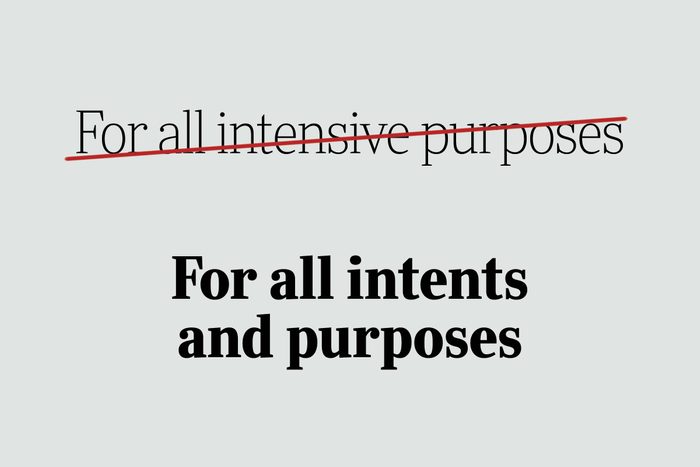
For all intensive purposes
If you're using this phrase to mean "for all practical purposes," then for all intents and purposes, yous're doing it wrong (see what we did at that place?). The phrase, "for all intensive purposes" is a mondegreen, which is divers as a misheard version of a phrase, saying or slogan. The phrase you're actually looking for (as you've probably guessed past now) is "for all intents and purposes."
RELATED: Fancy Words That Will Make You Sound Smarter
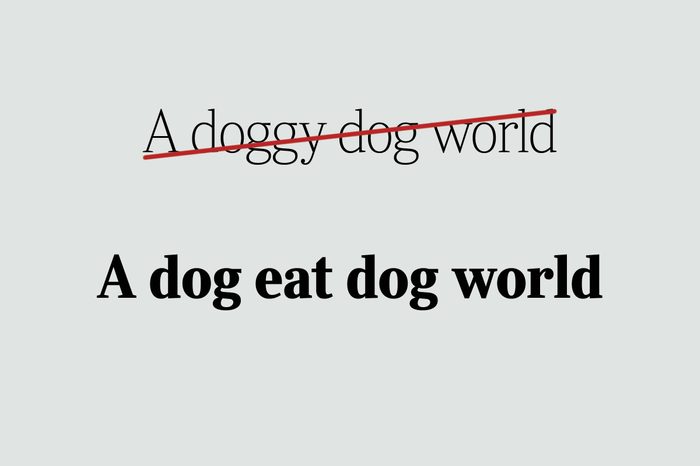
A doggy dog world
What you meant to say was "canis familiaris eat dog world," right? If so, it's understandable that you misheard/reshaped it equally a "doggy dog earth." This type of error is known every bit an "eggcorn," which reshapes an established discussion or phrase phonetically, without irresolute the actual meaning of the phrase (just as "eggcorn" reshapes the word "acorn" without irresolute its actual pregnant).
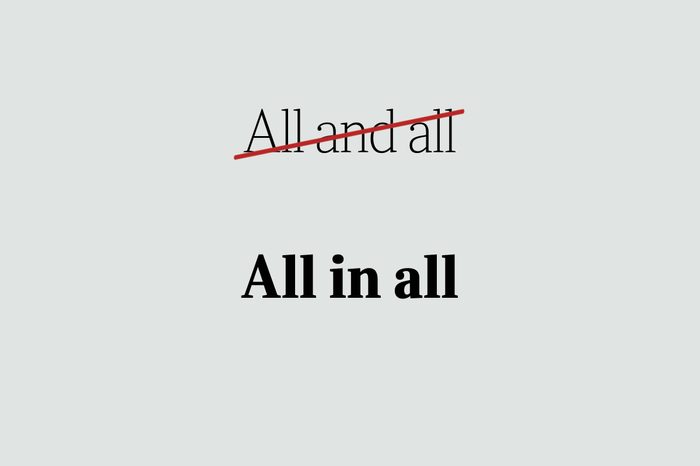
All and all
We promise that what you meant to say was "all in all," which is an idiom (a discussion or phrase whose significant can't be understood outside its cultural context) significant "everything being taken into business relationship." If you actually meant "all and all," and so you lot're just being redundant. Please never do this when it comes to acronyms, or grammar snobs will be maxim you have RAS (repetitive acronym syndrome. But if you're looking to be curtailed, y'all might desire to consider replacing "all in all" with "in sum."
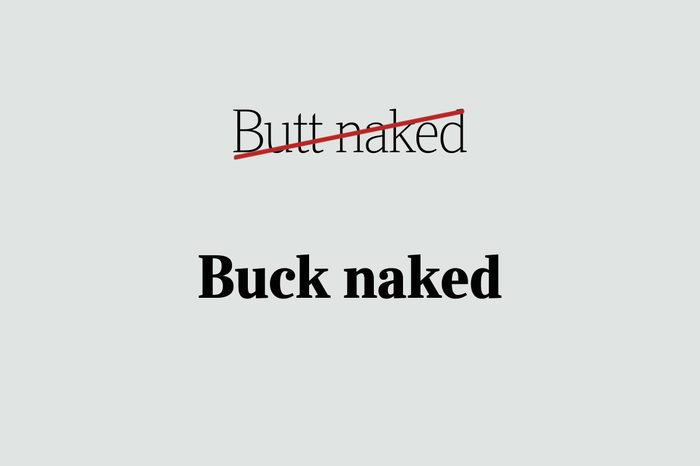
Butt naked
The affair virtually being barrel naked, is that it's more than just your butt that'southward hanging out in that location making yous look foolish. The actual term is "buck naked," although truth be told, and then many people have misheard information technology and misstated it as "butt naked" that grammarians actually are commencement to accept "butt naked" as a proper idiom.

All for non
If you retrieve this grammar practise is all for not, and then you lot might want to reconsider—considering nothing is actually "all for not," whereas something that is pointless may, indeed, be "all for naught." Yeah, it's old-timey. But information technology's the right fashion to say it. Distressing, not sorry.
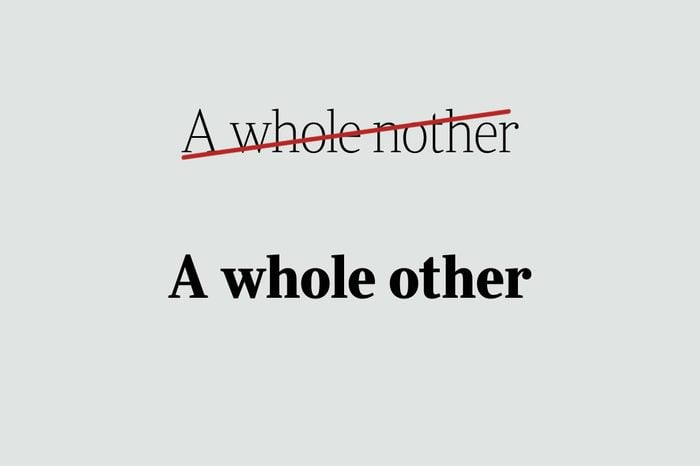
A whole nother
What'south a "nother"? Exactly. At that place'southward no such thing. It's a whole nother story may audio cute and colloquial, just information technology certainly isn't grammatical. What is grammatical is "a whole different story" or "another story" or even "a whole other story." Choose i, and sound like a boss.

At nauseum
You know when someone'southward droning on and on and on about something to the bespeak where you feel like you lot're going to exist sick? Well, they're going on ad nauseam. It's Latin for "to sickness." We know the "ad" sounds an awful lot like "at," but we can assure you it's not. And if we keep advertisement infinitum (to infinity) about information technology, y'all'll forgive us, won't you?
RELATED:Mispronounced Words
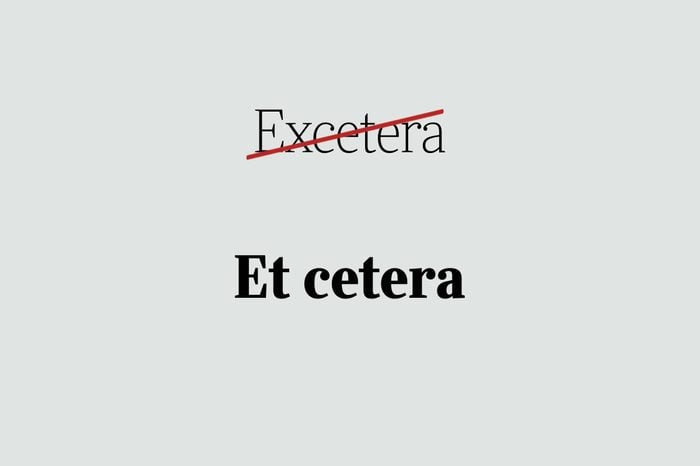
Excetera
This i gets pronounced incorrectly more than than it gets spelled incorrectly, simply considering, in writing, it tends to stop up abbreviated as "etc." But it's pronounced "Et-CEH-Terrah." There is no "ten" to be found anywhere.
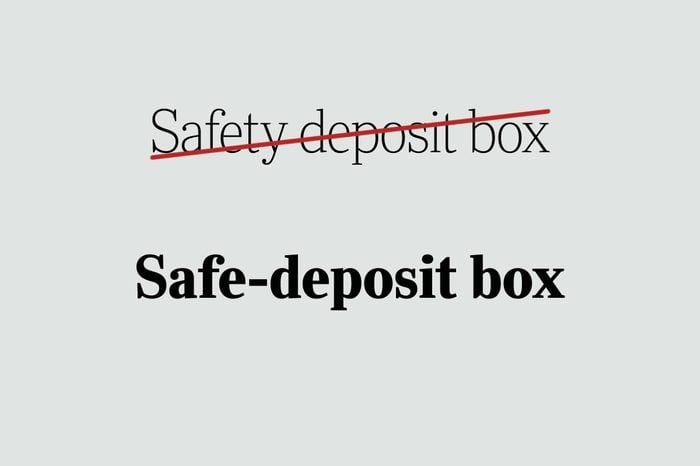
Safety deposit box
The phrase referring to a box in which valuables are stored is a "safe-eolith box" considering it'southward a box in which y'all tin make a rubber deposit. Not a safe deposit. Just this eggcorn is highly understandable because when you lot say "safe-deposit box" aloud, the first two syllables run together to sound exactly like "condom."
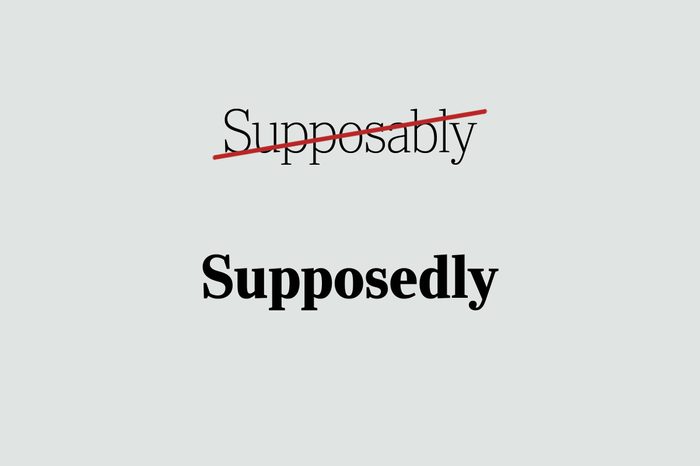
Supposably
We presume y'all're using "supposably" to hateful "according to what many believe." If so, then the word you're actually looking for is "supposedly."
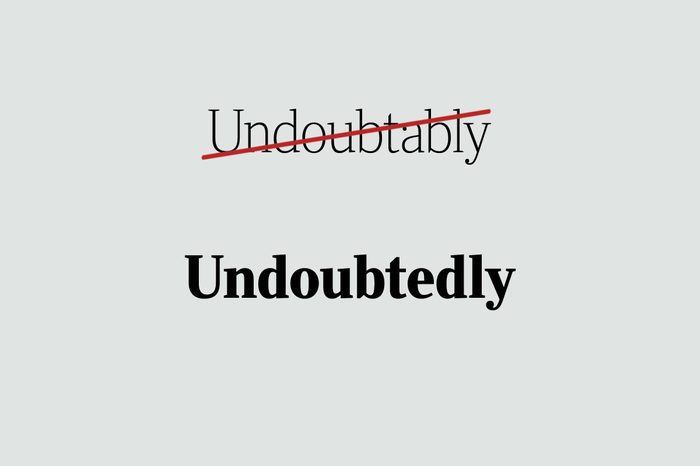
Undoubtably
If what you hateful is "without a shadow a doubt," then y'all take two choices, and neither of them is "undoubtably." Y'all tin say either "undoubtedly" or "indubitably." Either one is correct. Just don't mash them together to create an eggcorn.
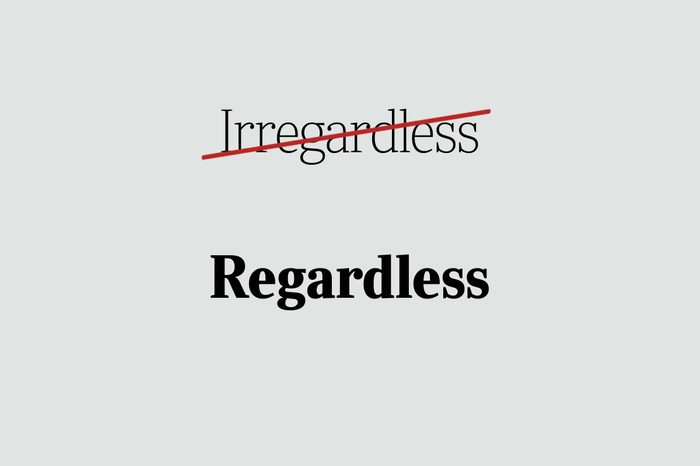
Irregardless
Yep, yeah, we know what you're about to say: The Merriam Webster Dictionary acknowledges irregardless equally a "discussion" becausefor all intents and purposes (come across what we did at that place?), its improper use has been and so stubborn and pervasive that information technology'due south get an actual word. However, "it is still a long way from the general acceptance," the dictionary editors admit as they recommend that everyone delight remove the "ir" from the get-go of irregardless and telephone call it what it is: regardless.
RELATED: Words That Will Brand You Audio Erstwhile

Should of
Did you say "should of" when you really meant "should have"? That's some other eggcorn, but now you know meliorate. It's "should take," "would have" and "could accept." There is no "of" in any of these phrases.
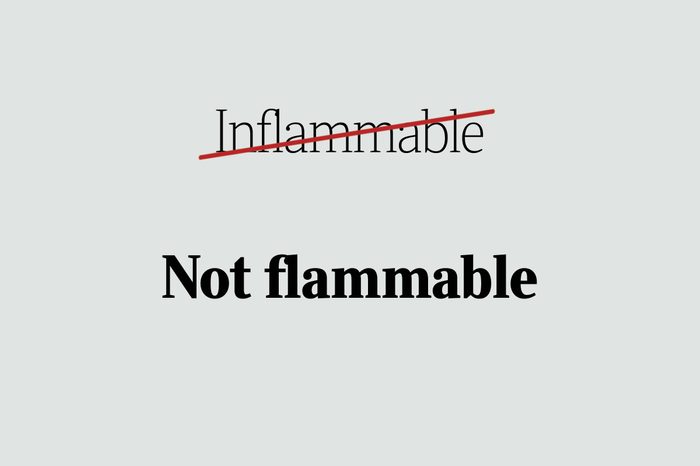
Inflammable
This i could get dangerous considering information technology literally means the opposite of what you call up it ways (and yes, that was the correct use of "literally"). Inflammable ways the same affair as flammable, which is to say, "flammable" or "capable of being set up on fire. And then if you're in the market for a practiced pot-holder, you should inquire for one that'due south not flammable.

Entitled
Yous're welcome to utilize the word "entitled" to describe someone who believes him or herself to be inherently deserving of special treatment. But if you employ information technology interchangeably with the give-and-take "titled," you lot're doing it wrong. Instead, just say "titled," as in "that book, titled The Leftovers, was made into an HBO series."
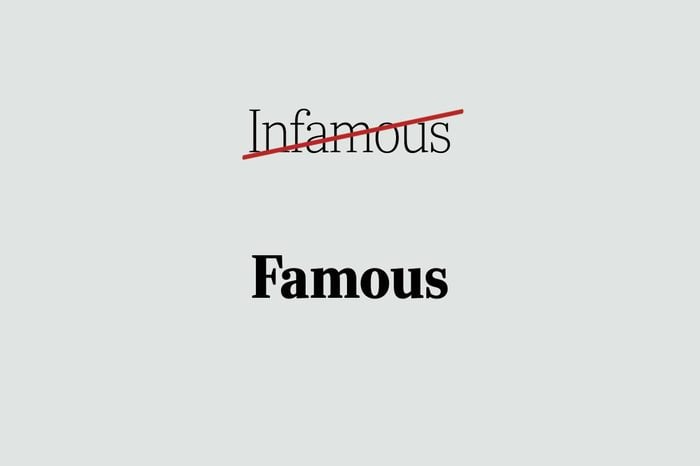
Infamous
If y'all're trying to say that someone is "very famous," then you lot're using the wrong give-and-take. "Infamous" means "famous for a negative reason." Thus, the Joker is infamous for his malicious ways and his evil express mirth, while Batman is famous for solving crimes in the city of Gotham.
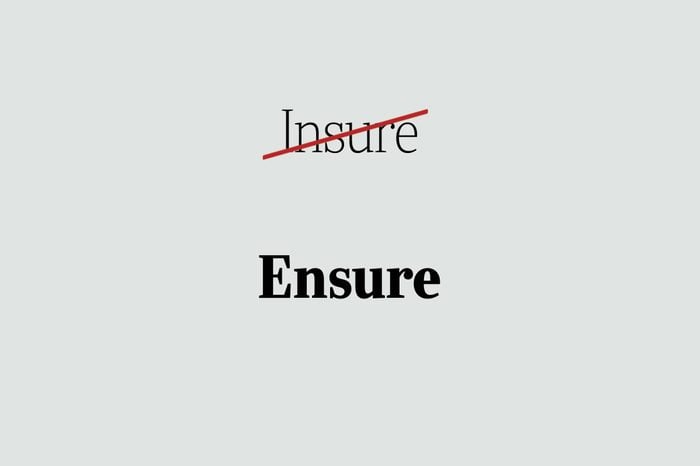
Insure
If you're not talking virtually promising to recoup someone for amercement, loss, injury, or death in exchange for advance payment, then you're using this discussion wrong. If you lot're talking about making certain of something, then you want to employ "ensure." If you're talking almost guaranteeing something, then you'll want to apply "assure."
RELATED: Words That People Say Aren't Real—Only Are

Bear upon versus Effect
We often misfile these two words considering they audio then much alike and cover and so much of the same ground. Here are some rules of thumb to follow when trying to determine which to use:
- Affect is a verb that ways to have an influence on. For instance: The weather affected my mood.
- Effect is a substantive that refers to the influence: For example: The weather had no upshot on my mood.
- Sometimes "affect" is used as a noun to refer to feeling or emotion. For case, "Her face bore a dismal affect." Using all three together: The weather always affected her mood. I could tell past her dismal bear upon that she'd been feeling the effects of 7 straight days of rain."
- Sometimes "issue" is used as a verb when it means to cause something (which is a stronger verb than "affect," which refers to merely having an influence on). Thus, you would "issue change," and could exist described as "constructive."
- Past contrast, yous would not use "affective" to describe someone who gets things washed. The word "affective" is used to when describing moods, and especially when describing mood disorders. For case, "He has an affective disorder. We aren't withal certain if it's depression or anxiety."

Poisonous versus Venomous
Poisonous refers to something that is toxic if you eat it. Venomous describes something that is poisonous if it bites yous. Snakes can be venomous; they cannot be poisonous.

Bemused
If you're using this word to mean amused, but in a discrete sort of way, y'all're using it incorrectly. What bemused really ways is that y'all're bewildered or confused. In fact, if you put the sounds of these two words together, they sound a bit similar "bemused," so perhaps that volition help you remember? Or here is an example of correct usage that might help: "While she was mildly tickled past the pic's comedic antics, she was nevertheless bemused past the fact that he'd taken her to a comedy when she'd said she wanted to see a romantic comedy."
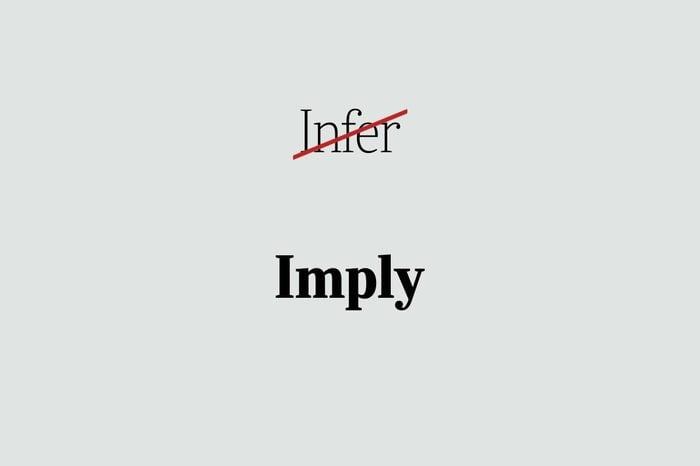
Infer versus Imply
If you lot're trying to read between the lines to understand what your lover is trying to tell yous, then you're attempting to infer something that isn't stated outright. Whatever your lover is saying in his vague and couched statements is not something he is inferring, merely rather something he is implying. To imply is to strongly propose or hint at something. Yous can infer what you will from what your lover implies. (Nosotros do hope it works out for you 2.)

Between versus Among
If you're trying to decide which of two people or things you lot will pick, you are going to decide between them. Add together a third, and "betwixt" should go "amid." That said, the Oxford English Lexicon says that either "betwixt" or "among" is advisable in such a instance, with the caveat that simply amid is advisable if the people or things are regarded collectively rather than individually. For case: There was agreement among members that fees should not exist raised (rather than between members).

Lay versus Prevarication
A person merely lies down. A person does non lay down, unless that person islayingdown a thing, such as a book or some other direct object. You can as well lay downward the law. And hens lay eggs.
There is an exception hither, and that is if you're talking about a person lying downward in the past tense. If what you lot're talking most is what you did last dark, then you laiddown. This is not to be confused with the past tense of the word "lie," when used to refer to a not-truth, in which case the by tense is "lied" as in, "He told a lie. Therefore, he lied."
RELATED: The Most Misused Word in the English Language

Sit versus Set up
If you're talking about plunking your lesser in a chair, you want to utilise the word "sit." If yous're talking about placing an object, it's "fix."

Principal versus Principle
These two words comprise a set of homophones: words pronounced alike that have different meanings and/or spellings. Homophones cause a great deal of confusion in the English language language. And this here is a prime example.
The trick to keeping these ii straight is to utilise "principal" in reference to a person and "principle" in reference to a standard, rule, or conventionalities. Retrieve this: At that place's a "pal" in "principal," particularly when the main in question replaces detention with meditation.

Capitol versus Capital
Hither is another set up of homophones, and if you're anything like usa, you find yourself pausing and thinking whenever you have to choose between them (in writing, obviously, because when said aloud, they audio exactly the aforementioned). But we're solving this once and for all:
- Capitol refers to a building, and specifically, the building where legislators run into. The term "Capitol Colina" refers not to the fact that Washington, D.C., is the upper-case letter of our nation, but to the neighborhood that houses the building where Congress meets.
- Capital is pretty much every other use. Information technology refers to the most important city or the governmental seat of a state, county, state, or other regions. It refers to an upper-case alphabetic character. And it refers to investment funds.

Compliment versus Complement
A compliment is something nice that y'all say. A complement is an addition, enhancement, or comeback. Hither's one way to retrieve the difference between this set of homophones: Both are overnice, but only the one that contains the "I" is personal. Or you can recall this sentence: "I compliment you on the way your dress complements your figure."

Shone versus Shown
In notwithstanding another case of dastardly confusing homophones, we give you shone versus shone. Not only practice they sound alike, they besides refer to something you can run into. Just here'southward the difference:
- Shown is the past participle of the give-and-take "show," which is a verb meaning to "exhibit" or "present."
- Shone is the past and past participle of the word "shine," which is a verb meaning "to emit light." Think of shoneas a fancy fashion of proverb "shined." For case: "The moon shone brightly overhead."
Hopefully, we've shown you the light, merely if that'southward the case, then you'll want to say that a light was shone on your defoliation. But await, you lot're probably wondering, when is information technology proper to use "shone" instead of "shined?" No worries, we've got answers-ish.
Shone definitely sounds cool when you say it out loud. Sadly, it's non used that much.

Shone versus Shined
No ane would error y'all if right about at present you were wondering: if "shone" is the by tense of "shined," then why doesn't anyone say "I had my shoes shone yesterday"?
The answer is that in modern writing, information technology's considered archaic (and therefore, wrong) to apply the discussion "shone" to refer to having shined anything then mundane equally shoes, silverware, or windows. That said, information technology's perfectly acceptable in modern writing to say that after y'all shined your shoes, your silverware, or your windows, they shone brightly.
Shone is past and past participle form of the verb shine when shine is used equally an intransitive verb meaning to emit light. Shone is a comes from the Old English word scinan, meaning shed light, be radiant, illuminate.
Shown is the past participle of the discussion show, which is a verb meaning to brand noticeable, exhibit, to nowadays, to bequeath. The word bear witness has existed in its present grade since around 1300, to mean the act of exhibiting, to view. In the early sixteenth century, evidence as well obtained the meaning of an appearance put on with the intention to deceive. In the early on eighteenth century prove came to mean ostentatious brandish.
RELATED:8th Grade Vocabulary Words
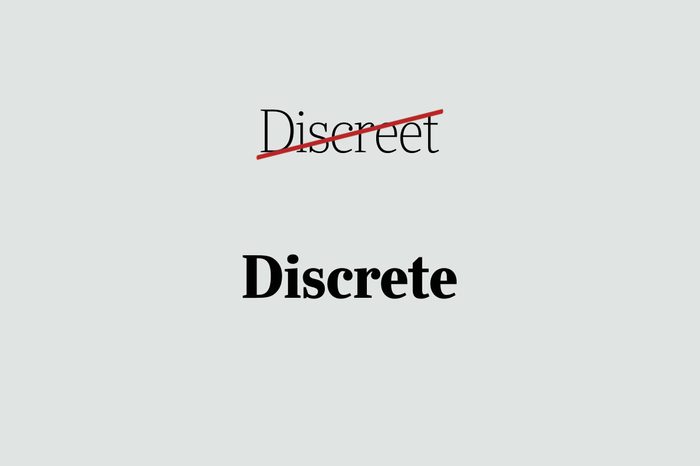
Discreet versus Discrete
- Discrete means individual, separate, or singled-out.
- Discreet means careful, cautious, or evidencing good judgment.
To remember the departure, think about i "e" versus 2. Use 1 "east" to refer to something atypical. Utilise an extra "eastward" to show extra care.
That said, "discretion" requires simply ane "east," but when you exercise discretion, you're adding 2 more.

Immigrate versus Immigrate
- When you leave your land to permanently live in another, yous emigrate.
- When yous arrive in some other country to alive permanently, yous emigrate.
To continue these 2 words direct, call up virtually them in alphabetical order: you emigrate before yous immigrate. You lot're an emigrant before you become an immigrant. Or simply think virtually the fact that when you immigrate to a new country, you must laissez passer through that new country's "Immigration Section."

Elicit versus Illicit
- Elicit means to draw forth or to coax out.
- Illicit means improper.
To remember which is which, call back of the "east" in "elicit" every bit standing for the "e" in "go out." And even if yous call back in that location's something e-xciting about things that are illicit, consider that "illicit" contains the root, ill.

Continuous versus Continual
Both words come from the root go along, but they really shouldn't be used interchangeably. Hither is how to use them properly:
- Continuous refers to something that has no end, which is to say that if something continues advert infinitum, it is continuous.
- Continual refers to something that stops and starts.
If you're on a continuous search for connection, you lot might be lonely. If your search for connection is continual, so yous might be a serial dater.

Further versus Farther
They sound alike, but don't confuse i for the other:
- Further refers to bodily physical distance, which is to say, a literal distance, as in "My machine's making a funny noise. How much farther is it to the service station?"
- Further refers to a figurative distance, as in "How much further can this car go before I have to sell information technology for scrap metallic?"

Bring versus Have
Trick question: What did you lot bring to John's party?
Snarky answer: Nothing, because you don't bring stuff to parties, y'all accept stuff to parties. I did bring abode the leftover chips, however.
Yous bring things hither. You take them there.

Home and Hone
- Hone is always a verb. It means to acuminate or brand more than acute. For example. you can "hone" a skill.
- Home is a noun that is also used sometimes every bit a verb to hateful to move in toward a destination or target with accuracy. For example, y'all can "home in on that delicious smell and realize information technology'southward freshly broiled cookies."
Although y'all might think that you can "strop in" on a target, the proper word is "home." The rule to remember is that if you need to add "in" or "in on" after the verb, you probably should be using "home." If not, then it's "hone."
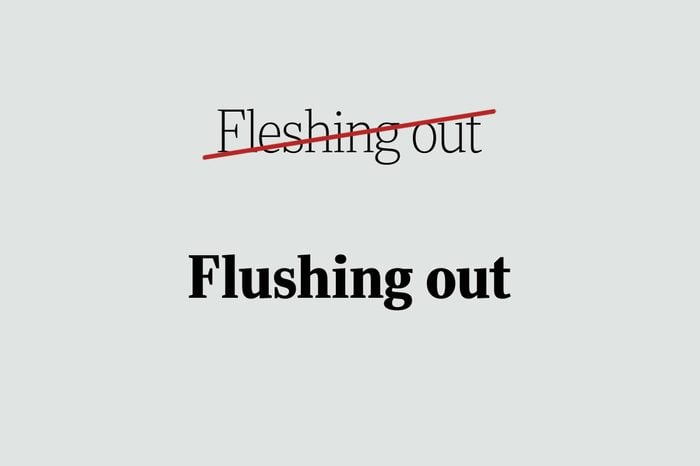
Fleshing out versus Flushing out
If you're talking about calculation substance to something, like writing an article that you've but outlined, then information technology'south "fleshing out," as in adding flesh to bones.
If you're talking about finding something that'due south not easily visible, then it'southward "flushing out" as in "flushing out the enemy." Withal dislocated? Here's how to know if you lot should use flesh out or flush out.
RELATED:Uncommon English Words

Feasible versus Feasible
Viable and viable are often, admitting incorrectly, used interchangeably. However, feasible refers to whether something is capable of surviving.Feasible refers to whether an action is possible.
Accordingly, a feasible candidate must have a viable plan.
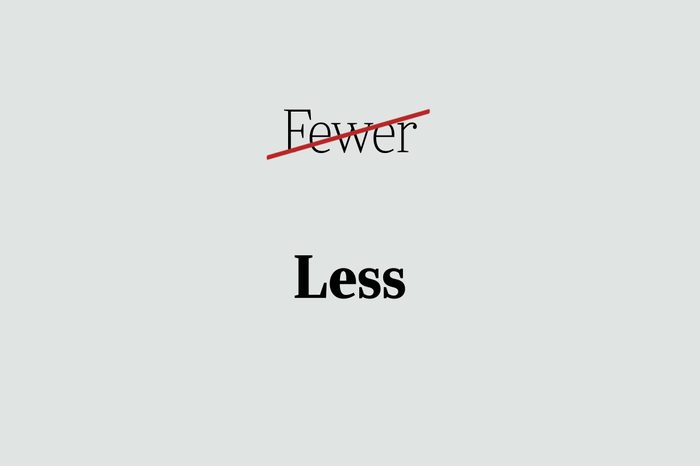
Fewer versus Less
Fewer refers to items that you can actually count, like hours or dollars. Less refers to generalities, like time or money.

Perpetrate versus Perpetuate
- To perpetrate something is to commit it.
- To perpetuate something is to continue it.
If you lot perpetrate a crime, you perpetuate criminality in our society.

Perquisite versus Prerequisite
Perquisite usually ways an extra allowance or privilege. Prerequisite means something that's required.
To call up the difference, think of the film titled The Perks of Being a Wallflower. The "perks" in the title are brusque for "perquisites." What would be the prerequisites of being a wallflower, we wonder? Whatever information technology is, we think it more than likely involves a humblebrag.

Pored versus Poured
Ah, withal some other sneaky homophone. When you're talking about studying something intently, use "pored," as opposed to "poured."
Pouring refers to what you do with a liquid. But if that doesn't help you think, think of the pores of your skin. To see them, you must "pore" over your face in the mirror.
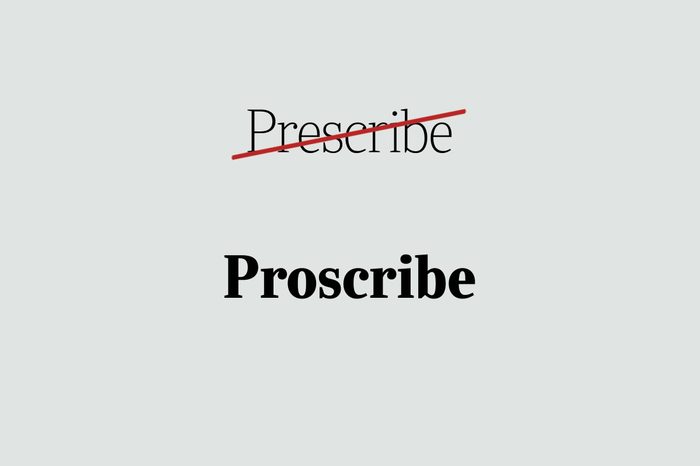
Prescribe versus Proscribe
To prescribe something is to control or recommend it. While you lot tin't prescribe a person, y'all can proscribe a person or a affair. To proscribe someone or something is to outlaw him, her, or it.

Regretful versus Regrettable
- Regretful ways filled with regret.
- Regrettable means lamentable or unfortunate.
Accordingly, one would be regretful over one's regrettable actions.
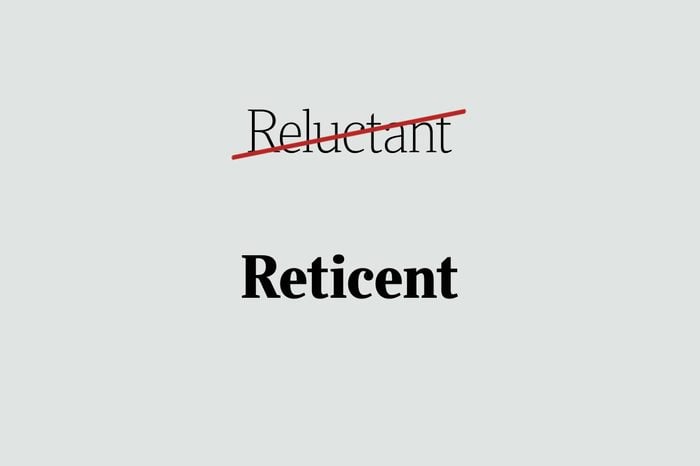
Reluctant versus Reticent
These two words both accept to do with being less than willing to do something. Even so, reluctant describes unwillingness in general, whereas reticent is used only in reference to speaking. When one is reticent, it ways he is reluctant to share his thoughts.
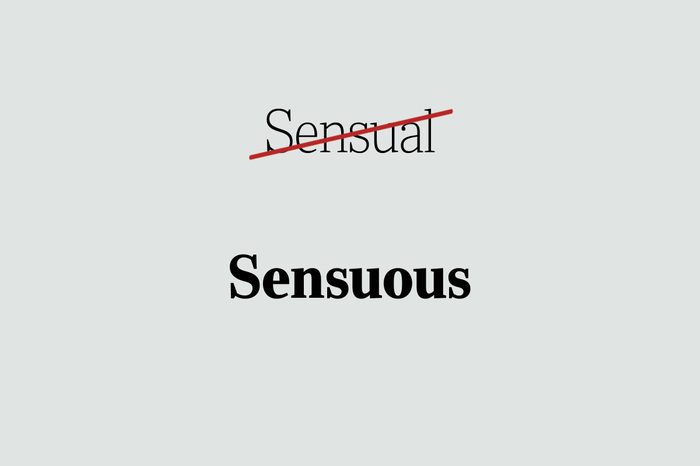
Sensual versus Sensuous
Both words refer to the senses. Merely of the two, sensuous is the less provocative word.
- Sensuous refers to things that relate to the senses or fifty-fifty entreatment to the senses. For instance, hand cream can be described as sensuous.
- Sensual also refers to things that appeal to the senses, but the connotation is erotic. For example, the way one applies their hand cream may be sensual.
If you desire to describe the lines of a painting, you lot might use the word "sensuous." If you want to describe the curves of a woman'southward body, you lot can also use "sensuous," but using "sensual" will take the chat to a sexier place. To remember the difference, think of the discussion "sexual," which is more similar in spelling to "sensual" than "sensuous."
RELATED:Winning Spelling Bee Words
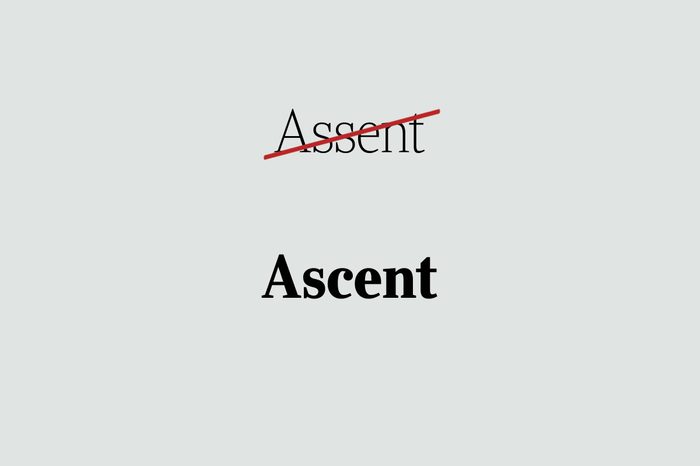
Assent versus Ascent
To assent is a verb that means to agree.
Ascent is a noun that refers to a climb, equally in "the first ascent of Mt. Everest," or a liftoff, equally in "the ascension of the balloon."
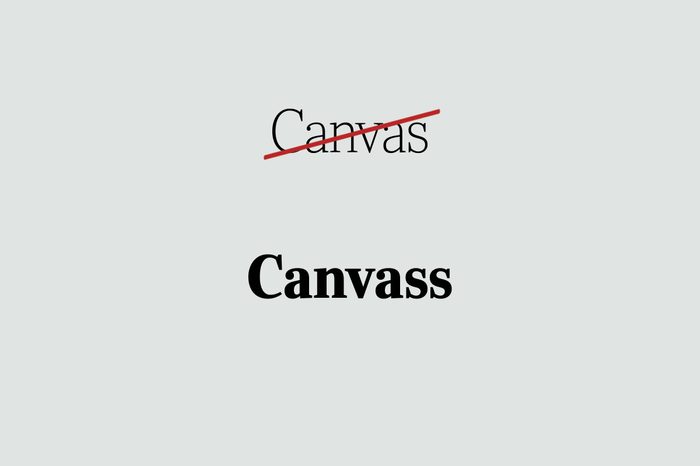
Canvas versus Canvass
Canvas is a type of material that tends to exist tough and stiff.
Canvas is a verb that ways to try to ascertain people'south opinions.

Illusion versus Allusion
An illusion is a misleading image or impression, such as an optical illusion.
An allusion is a reference to something else, such as a literary allusion.
RELATED:Funniest Oxymoron Examples
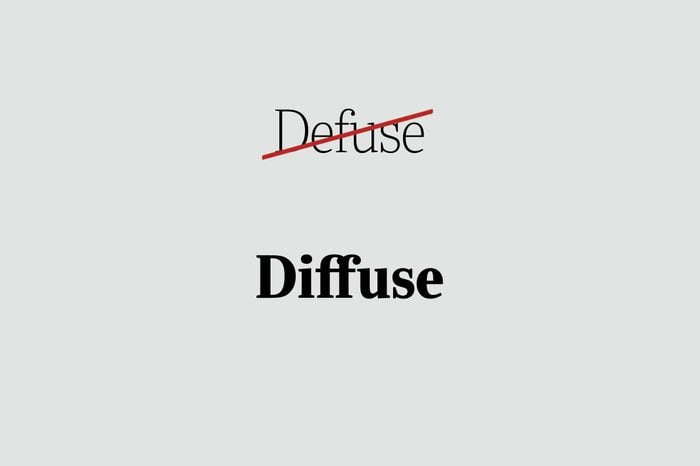
Defuse versus Diffuse
Defuse is a verb that ways to return a bomb non-explosive (by removing the fuse, or otherwise). It can as well refer to rendering a state of affairs less dangerous.
Diffuse is a verb that means to disperse over a broad surface area. Diffuse tin can also be used as an adjective that describes something that is not concentrated (in other words, something that might take been diffused). In the latter case, the give-and-take is pronounced with a soft s-audio, like the word "so," equally opposed to a hard southward-sound similar the word "use".

Detach versus Dissemble
Dissasemble is a verb that means to take something apart.
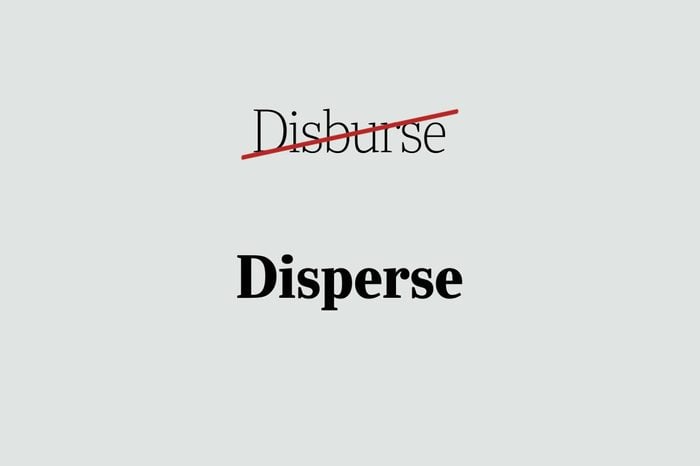
Disburse versus Disperse
Both disburse and disperse are verbs that involve distributing things. But:
- Disburse ways to give or hand over coin or funds.
- Disperse is a verb that ways to besprinkle, and it has zero to do with coin or funds (except in the extremely rare case that a zillionaire decides to disperse hundred dollar bills to the customs by dumping them out of his private airplane).

Disinterested versus Uninterested
Existence disinterested doesn't hateful you're not interested in something, but rather that you accept no bias about it (equally in, no personal pale). By contrast, being uninterested means you're not interested or intrigued by something.
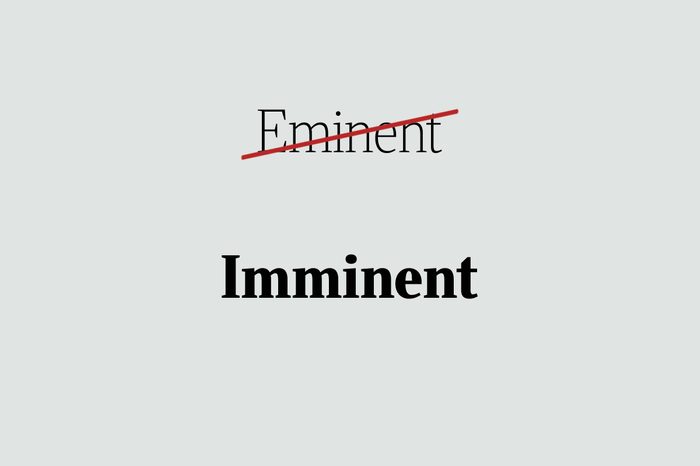
Eminent versus Imminent
Eminent describes something or someone prominent.
Imminent describes something that is about to happen.
Accordingly, an eminent professor of grammar predicts that your mastery of the English language language volition be imminent upon reading this commodity.

Emoticon versus Emoji
Both emoticons and emojis are graphical expressions used in electronic communication. But:
An emoticon is a typographic display intended to suggest a facial expression. For example, the emoticon for a winky-face is a semi-colon followed by a right-parenthesis.
An emoji is an actual visual epitome, and it need not be of a face.

Remodeling versus Renovating versus Restoring
Remodeling and restoring are terms of art to architects and interior designers, and they hateful unlike things:
- Remodeling means changing the structure of a space. For example, if you build a 2d floor on a ranch house, yous are remodeling it.
- Renovating refers to significantly changing a spacewithout irresolute its construction. For case, if you remove your bath fixtures and replace them with new ones, you are renovating the bathroom. If you kickoff moving walls or calculation new windows, then you're remodeling.
- Restoring means returning a space to its original graphic symbol or use. For example, removing vinyl siding and repainting the original forest siding of a firm is a restoration projection.
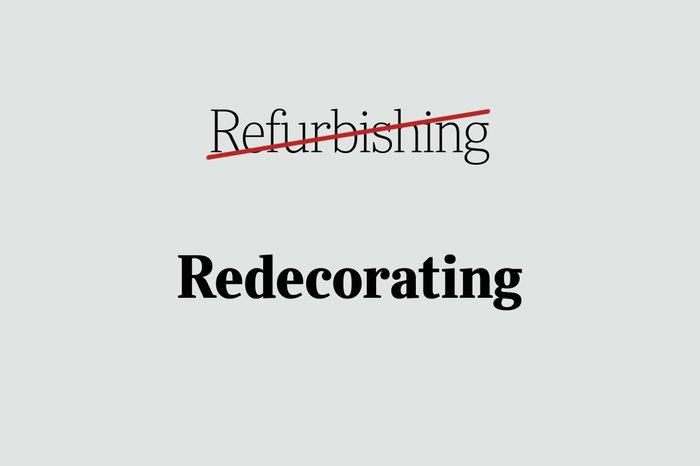
…versus Refurbishing versus Redecorating
The term refurbishing is a form of renovating. It refers to rebuilding or replenishing with new textile. You can refurbish your wood floors as role of a renovation project.
Redecorating means changing the graphic symbol or scheme of infinite's decor. Redecorating is the least structural of all of the aforementioned "R" terms. Y'all tin redecorate by bringing in a new sofa or hanging new posters on the wall. Remodeling, renovating, restoring, and refurbishing can involve redecorating.
RELATED: Funny Palindrome Sentences

Judicial versus Judicious
Moving on from compages and interior pattern to the legal world, we're going to clear upwardly, one time and for all, the deviation between judicial and judicious.
- Judicial means "connected with a courtroom of law."
- Judicious means "wise."
Hither'south a manner to remember the difference: Not all judicial decisions are judicious.

Libel versus Slander
Both libel and slander are forms of defamation, which is the making of a statement near someone that is both imitation and derogatory. The difference between libel and slander is in how that statement is made.
Slander is any oral publication of a defamatory argument.
Libel is a written publication of a defamatory statement.

Alibi versus Excuse
These terms are ofttimes used interchangeably. All the same, they do non mean the same affair. At all.
- As a noun, "alibi" refers to proof that you were elsewhere when something happened. When someone provides an excuse for you, they are offering that proof.
- As a noun, "alibi" refers to any explanation of your behavior, it is understood that by offer an excuse, you lot are substantially albeit to the behavior. When someone excuses y'all, they are forgiving you.
Appropriately, if you lot ate the terminal slice of pie, and you offering me a skillful excuse (y'all were actually, actually hungry, for example), I might excuse yous. If you didn't consume the last piece of the pie, merely it'due south gone just the same, you might want to offer me an alibi, or accept your friend offering to alibi you.

Patent versus Copyright versus Trademark
Created something you think is crawly and you desire to make sure you go the credit? Then you're going to need to know the departure betwixt a patent, copyright, and trademark.
- If it'due south an original invention of some kind, then you'll want to look into getting a patent. If you happen to exist curious about the invention of the toilet paper holder, so you'll want to read about this guy, who holds the patent.
- If it's something you wrote that expresses an thought in a unique way, such as a work of fiction, you'll want to think about registering the copyright.
- If it's a slogan or logo that identifies a product, yous're talking most a trademark.
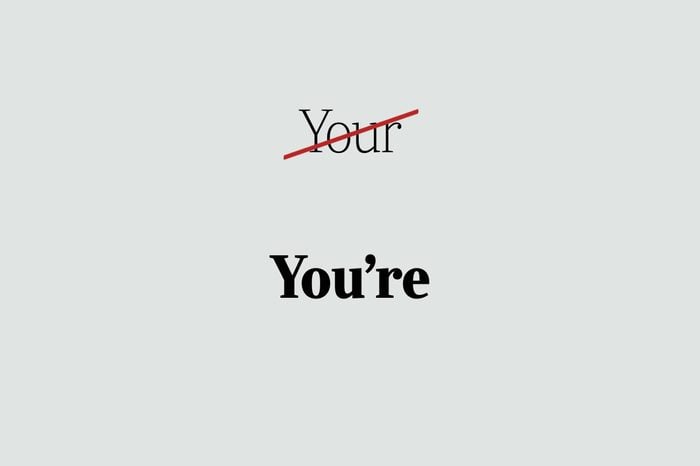
Your versus You lot're
Every bit painful as it is to address this set of homophones, because the widespread use of "your" in place of "you're" and vice versa, it seems that information technology would be negligent not to do and so. And then hither information technology is:
You're is a contraction of two words: you and are.
Your is a possessive form of the pronoun, you. If something belongs to you, it is yours.
If you write "you're," then you should be able to substitute "you are" in its identify. If you cannot, and then use "your." Nosotros hope you're able to use this rule in your everyday life.

Their versus They're
Since we went there with you're/your, information technology seems wrong not to become "they're/their" involved besides. Again, nosotros're talking well-nigh a ready of homophones, and once again, ane in the set is a contraction of two words, and the other is a possessive class of a pronoun:
- They're is a contraction of two words: they and are.
- Their is a possessive grade of the pronoun, they. If they ain it, it is theirs. If it belongs to them, it is also theirs.
If you write "they're," then you should be able to substitute "they are" in its identify. If you cannot, then use "their." Or, maybe, there.
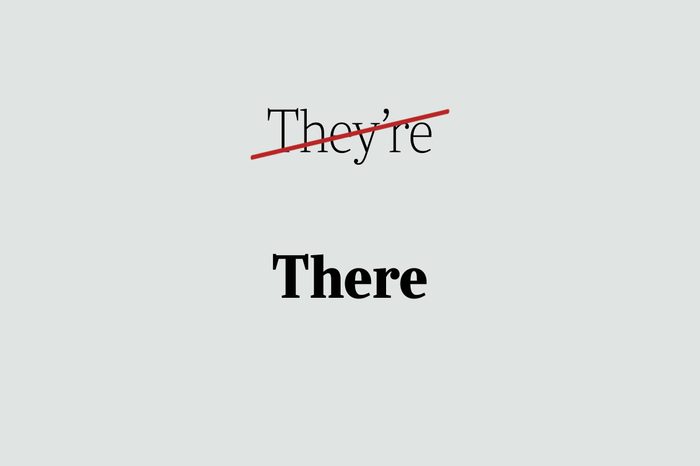
They're versus There
There refers to a place that is not here. If you are referring to a place that is not here, then that calls for the use of the give-and-take, "at that place." If you lot are using this discussion to refer to "they are" or the possessive grade of the pronoun "they," and so you exercise not want to use this give-and-take.
RELATED: Grammar Jokes

It's versus its
Yep, we're going here likewise, and maybe it'south because nosotros're simply a little compulsive nearly grammer.
- Information technology's is a contraction of two words: it and is.
- Its is the possessive form of it.
Hither'south a rule yous tin can use to recall the divergence: Just considering it's possessive, doesn't mean its spelling must include an apostrophe.
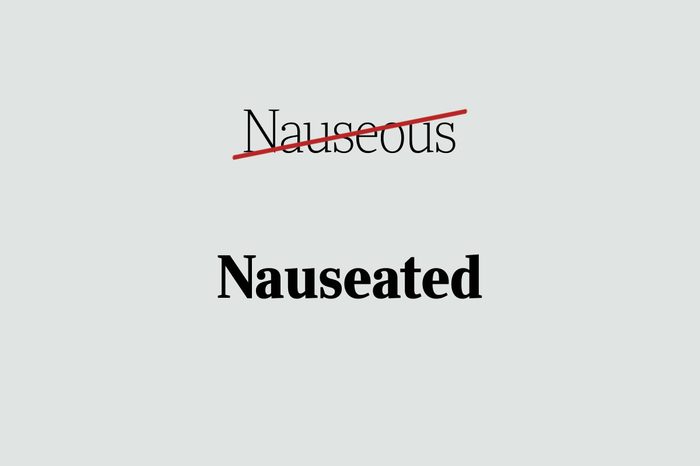
Nauseous versus Nauseated
Believe it or not, "nauseous" actually doesn't hateful feeling sick to your tummy or affected by nausea—that's nauseated. Technically speaking, every time you say "I'chiliad nauseous," you lot're saying that y'all cause or inflict nausea, as that's the bodily meaning of "nauseous." A way to use this give-and-take correctly would be, "I knew that the milk was rotten when I got a whiff of the nauseous smell coming from the carton." Smelling this nauseous rotten milk probably made you feel nauseated. "Nauseous" has been used to mean "nauseated" for and so long, however, that many a dictionary editor has come to accept information technology as another meaning for the discussion.
RELATED: The Clever Mode Dictionary Editors Prank Each Other
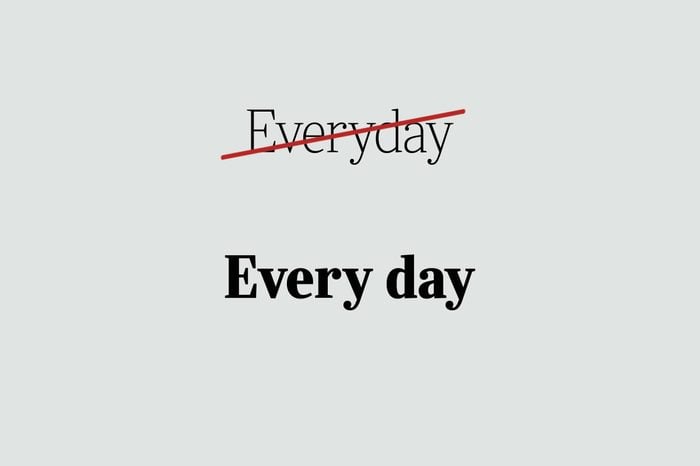
Everyday versus Every 24-hour interval
If y'all do something 7 days a week, you practise itevery mean solar day. "Twenty-four hour period" is a noun, and "every" is the adjective that modifies it—two different words. Meanwhile, everyday, as a single discussion, is an adjective that means commonplace or routine. Then, no, you do not brush your teeth everyday. That just doesn't make sense. Tooth-brushing, even so, might be an everyday occurrence. Grammarist.com has a tip to brand sure you're using the right version of these eight letters: if replacing them with "each twenty-four hour period" makes sense, "every mean solar day" is the way to go, and then make sure yous've got that space.
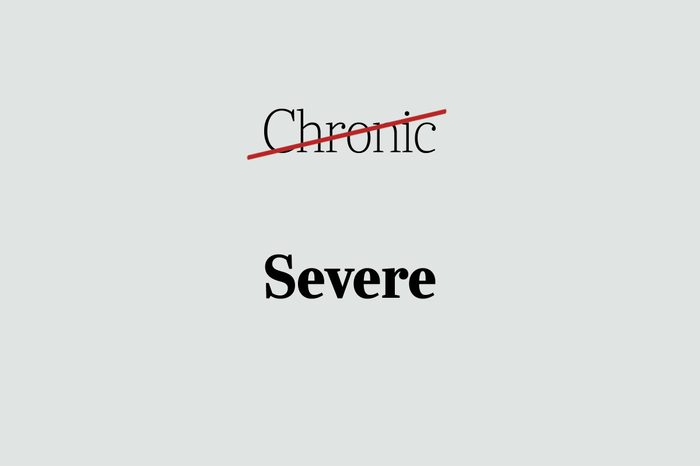
Chronic versus Severe
These ii terms are easily dislocated because both describe extreme medical conditions—but they draw dissimilar kinds of medical weather. Though both severe and chronic weather condition are not contagious, "severe" just refers to more extreme, painful versions of mutual maladies. Headaches, stomach aches, and coughs can be severe, but they are not life-threatening and can be cured. Chronic weather, on the other paw, can be fatal, and, in fact, are a fairly common cause of expiry. Chronic conditions must last at least three months and often last a person'south unabridged life. Diabetes, asthma, HIV, and cancer are chronic atmospheric condition.
Well, by at present you've probably figured out that we kind of accept a thing for words. We love them! And if you use one of these regional sayings, we can probably guess exactly where you're from.
Sources
- Grammarist: "Eggcorns and mondegreens"
- Grammarist: "Idioms"
- Grammarist: "Day in historic period (day and historic period)"
- Grammarist: "Cadet naked, butt naked"
- Merriam-Webster: "irregardless"
- Merriam-Webster: "homophone"
- Lexicon.com: "Principal vs. Principle"
- Grammarist: "Shined vs. shone"
- WikiDiff: "Refurbish vs Redecorate – What's the difference?"
- Laws: "Libel vs. Slander"
- Grammarist: "Nauseating vs. nauseous"
- Grammarist: "Everyday vs. every day"
- Divergence Between: "Difference between Astringent and Chronic"
Originally Published: Apr 23, 2020
Source: https://www.rd.com/list/words-youre-using-wrong/
Post a Comment for "Which Words Suffix Has Been Added Incorrectly Funny Getting Forgoten Cropped"